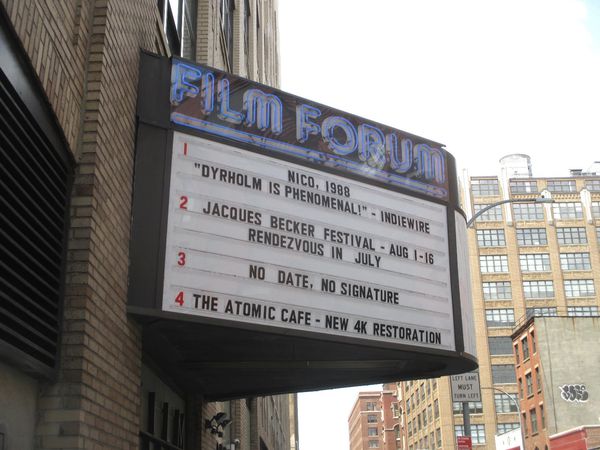 |
| Susanna Nicchiarelli's Nico, 1988 star Trine Dyrholm: "It's so important to have such complex female characters on screen." Photo: Anne-Katrin Titze |
"This is Berlin, my darling, it's burning," says a mother to her daughter. The child is to become The Velvet Underground and Andy Warhol icon known as Nico. Susanna Nicchiarelli's Nico, 1988, a highlight of the Tribeca Film Festival and the Horizons Award Best Film winner at last year's Venice International Film Festival, stars an outstanding Trine Dyrholm as Christa Päffgen (Nico's birth name). John Gordon Sinclair is her hapless manager Richard, Thomas Trabacchi music collaborator Domenico, Sandor Funtek is Christa's lost son Ari, Anamaria Marinca (Cristian Mungiu's 4 Months, 3 Weeks And 2 Days) is violinst Sylvia, and Karina Fernandez is Laura.
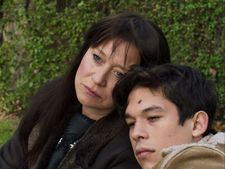 |
| Nico (Trine Dyrholm) with her son Ari (Sandor Funtek): "It's a universal film. It's a film about a mother, a woman, an artist, a war generation, a human being." |
Nicchiarelli's extraordinary film, produced by Marta Donzelli (Laura Bispuri's Sworn Virgin, Daughter Of Mine) Valérie Bournonville (Clément Cogitore's Neither Heaven Nor Earth), Gregorio Paonessa (Shirin Neshat and Shoja Azari's Looking for Oum Kulthum), and Joseph Rouschop (Abel Ferrara's Pasolini) is not about Nico's most famous years (which flash onto the screen in snippets of archival footage shot by Jonas Mekas), nor, with the exception of a few flashbacks, about her war time and postwar German childhood. In Nico, 1988 the focus is on 1986 and the two following years when Nico was working on her solo career, living in Manchester because, as she says "it reminds me of Berlin after the war in ruins."
Her bluntness and honesty are disarming and Trine Dyrholm, star of Thomas Vinterberg's The Commune and Festen, gives a fascinating and bold performance in song and words and physicality. A stolen bracelet from Italy (stealing is more fun than getting it as a gift, says Nico), stupid questions at a stupid radio interview, reuniting with her beloved son Ari on a park bench at a psychiatric hospital, the comment that "young people are boring", her relationship to food and hunger, and multitasking in the bathroom while looking to rent a house (that includes recording the sound of an old boiler and shooting heroin into her ankle) - Nico cannot be easily summed up as so many tried. Her singularity remains, or in the words of Wordsworth: "The marble index of a mind for ever Voyaging through strange seas of Thought, alone."
 |
| Trine Dyrholm: "As an actress you have to find cracks in the character where you invite the audience into the inner chaos of the character." Photo: Anne-Katrin Titze |
In the second half of my conversation with Trine Dyrholm at Magnolia Pictures we discuss how Nico was "defined by men all the time", portraying inner chaos, the need for complex female characters on screen, the costumes designed by Francesca Vecchi and Roberta Vecchi for Nico, 1988, and Trine's upcoming roles.
Anne-Katrin Titze: Some of the things Nico says in the film! "I hate young people, they're so boring."
Trine Dyrholm: She has such ironic sarcasm and she's not a pleaser. That's also very fascinating because we especially as a woman, it's like "Oh, do they like me?"
AKT: She doesn't care.
TD: She is like "Who cares?" "Do you want to tell us about Andy Warhol?" She is like "No, I don't!"
AKT: And she invented stories, such as her father helping a lot of Jews during the war.
TD: I think that goes with the guilt of being a German. She struggled with that. What kind of identity is that to have to come from the war country, the evil ones? I think she struggled a lot with that.
AKT: There is a moment when she says Manchester reminds her so much of Berlin in ruins. She is searching for an idea of home.
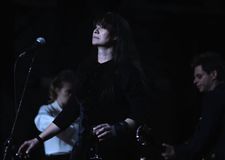 |
| Trine Dyrholm on Nico: "She has such ironic sarcasm and she's not a pleaser." |
TD: I read somewhere that she says, "Every time I close my eyes, lying on my pillow, I'm back in a destroyed Berlin." I think it made a big impact on her, that whole thing - being a child in the war and who are you then? It's about identity. You're German, you are the guilty one, but you were a child and you don't know how to fill that kind of person out.
AKT: Also her star identity. Everyone seems to want to limit her to these years of fame.
TD: She was defined by men all the time. By Andy Warhol, by being with Velvet Underground. She didn't fit that narrow image, being only the beautiful woman. I think she struggled a lot with wanting to be respected for her art and not her beauty.
I was also very inspired by an interview I saw where she was asked "Do you regret anything?" And she says "No, I don't regret anything other than I was born a woman and not a man." She was part of a male environment. It was not good to be a drug addict woman and a mother that is not a good a mother and lose custody.
AKT: We see her in the film with her recorder, recording sounds, trying not to be defined by the men around her. We are in 2018, the film is called Nico,1988. Thirty years distance and still so much to struggle with. It really is a film that hits a chord right now.
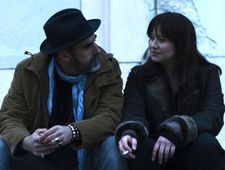 |
| Domenico (Thomas Trabacchi) with Nico (Trine Dyrholm) |
TD: I think so too. I'm very proud of being part of this film, also because of the portrait of such a character. It's not often that you have not likable characters. It's so important to have such complex female characters on screen.
AKT: Absolutely true.
TD: As an actress you have to find cracks in the character where you invite the audience into the inner chaos of the character. What are they struggling with? So you get a feeling of her emotional state of mind. The extent of her loneliness that is there.
AKT: You have two upcoming projects connected to real-life people. One is about Astrid Lindgren?
TD: That is right. I am playing a small part there.
AKT: Somebody who really existed?
TD: Yeah. We don't know much about that woman because she was a Danish woman and she took care of young children that couldn't be with their moms. She was a real person. And then I played Ruth Berlau.
AKT: Bertolt Brecht's …
 |
| Nico, 1988 co-producer Marta Donzelli Photo: Anne-Katrin Titze |
TD: … who was Bertolt Brecht's girlfriend, colleague. That was just by coincidence that suddenly I got these real-life people.
AKT: The power of Nico could go into those? Ruth Berlau and Nico? Why not?
TD: Of course the film is about Brecht, so Ruth Berlau is only a small character but she's a very fascinating woman. When she was 17, she bicycled alone from Copenhagen to Paris to write stories. She also did that by bike to Moscow.
AKT: That's incredible.
TD: What's also interesting, there are other portraits of Nico in films not about Nico, but for instance that she does a blow job in the elevator. Isn't that the Oliver Stone film, Marta? [Trine turns to her producer Marta Donzelli for confirmation].
Marta Donzelli: Yeah, The Doors.
TD: The Doors. And she's just reduced to the blonde girl that has an affair with Jim Morrison or whatever. And now she has her own space in history with this film [Nico, 1988].
AKT: She does. Setting wrongs right. You gave that to her. The film gives something back.
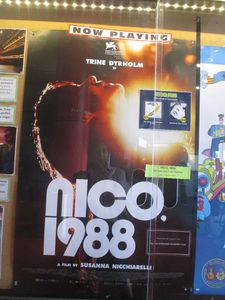 |
| Nico, 1988 poster at Film Forum in New York Photo: Anne-Katrin Titze |
TD: That's what I realized. When I look back in Danish history and I watch the films, there are not a lot of female stories that are being told.
AKT: That's what the film shows also, take out the Nico stardom part, and it's fascinating to watch Christa before and after Nico.
TD: It's not just about Nico. It's a universal film. It's a film about a mother, a woman, an artist, a war generation, a human being. In life, struggling with a lot of difficult issues - that's when film hopefully works when they are universal so it's about all of us.
AKT: I thought the costumes for Nico worked so well. They are again not copying her. They seem like something you could have chosen together with the costume designer.
TD: We had two costume designers [Francesca Vecchi and Roberta Vecchi]. They were very good.
Marta Donzelli: They are sisters.
TD: They're sisters, Italian sisters. It's always a mix when you do costumes. They come with things and then I suggest and Susanna, the director. It was kind of a combination. I would find out of what they have we found this is the right thing, this works on me. Because sometimes you can watch costumes and say this would be good for the character and then when I put it on it doesn't work. So it has to work with me.
AKT: Right, and it does. It creates that third Nico.
Read what Trine Dyrholm had to say on finding Nico's voice, the emotional states of mind of her character, and Susanna Nicchiarelli's vision for Nico, 1988.
Read what Susanna Nicchiarelli had to say on finding inspiration, a different kind of beauty, and why she made Nico, 1988.
Read what Susanna Nicchiarelli had to say on Trine Dyrholm, Nico's sense of irony, and the look from costume designers Francesca Vecchi and Roberta Vecchi for Nico, 1988.
Nico, 1988 is screening at Film Forum in New York.





















